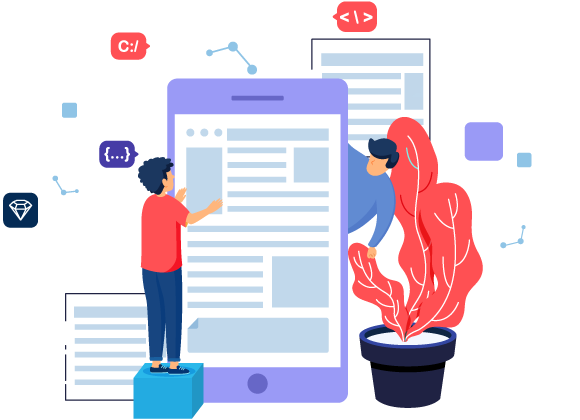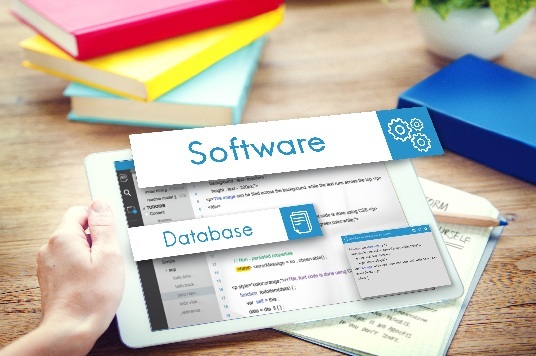The software development world was never like this earlier as it is today. Everywhere we look around, we find innovative digital apps, super engaging and classy websites, beyond imagination digital experience, and top-notch technologies revolutionizing the everyday life of digital users.
It happens to the users, but businesses of all kinds are also significantly impacted by this digital revolution. They get the opportunity to work with modern software development processes, build robust, innovative products, incorporate trending technologies into their business workflow, and work with a team of top talents.
The changing software trends help enterprises understand customer pain points and unlock customer needs and future demands.
Today it is not just about building a software product. It’s all about creating a top-quality, innovative, reliable, customer-favorable, and pocket-friendly software product that satisfies customer needs in all aspects.
Here we are going to provide you with a brief description of the two kinds of software, i.e., off-the-shelf and custom software.
Off-the-shelf software is a ready-to-use and packaged solution created for a broad audience and many business areas.
In custom software development, the process is highly organized and customer-specific. It is a continuous innovation process that helps you deliver a great digital product.
This post will help you differentiate between the two kinds of software development, their pros and cons, usability, and cost to give you a headstart into the type your business should go for.

What Is Off-The-Shelf Software?
Off-the-shelf software is readymade, pre-packaged, and commercial software that has been developed for the mass market. Off-the-shelf software is a ready-to-use packaged solution that’s easy to implement with little to no customization.
These are standardized software applications designed for a broad range of customers, offering a comprehensive set of features to streamline business operations.
However, off-the-shelf apps do not always fulfill all the specific tasks or area demands.
They are intended to be integrated into current systems. There is no need for customizability here. Off-the-shelf software products enable it to be packaged, marketed, and dispersed to satisfy a wide range of business requirements.
Let’s check out how off-the-shelf software development benefits your business.
-
Off-the-shelf software is an affordable and user-friendly pre-made product created for the mass market.
-
As off-the-shelf is ready-to-use software, you just have to buy it and install it. It reduces your time and effort.
-
The off-the-shelf software is also available on a trial basis before you purchase it. You can get the software offer on free or discounted trials. It is easy for you to test the product for yourself and see how it fits your work process.
-
You can also read the reviews and testimonials about the software from other users. With the commercial software's real insights, you can identify whether the product is reliable and has good value for the money or not.
-
Regular updates will be required due to the demands of off-the-shelf software. It will vary from product maintenance to bug fixes and even new features.
Real-Life Examples of Off-the-shelf software
Off-the-shelf software design applications or softwares that are readymade, easy to use, and easily accessible to the audience. Here listed some examples that you might have used in your life.
- Video games like FIFA, Call of Duty, and Angry Birds
- Gmail and Microsoft Office
- Media Players like VLC, and Windows Media Player
- CRMs (Customer Relationship Management) like Salesforce
- HubSpot
- Zoho.

Defining Custom Software Development
The software development process that includes ideation, design, development, deployment, and maintenance designed for a specific group of audiences, processes, or organizations is termed as custom software development.
Custom software development provides your customers with a tailored solution that includes multiple stages like ideation, design, development, testing, deployment, and maintenance. The custom solution is designed from scratch that satisfies a specific set of project requirements and is performed by in-house development teams or software development outsourcing providers.
To better understand custom software development, note the following definitions first.
-
application modernization – It is about upgrading or updating existing technology to modern standards
-
application customization – It is about modifying COTS applications towards individual needs
-
application management – It is about optimizing software to support tasks such as installing, updating, and other service desk software related to maintenance
Let’s check out how customized software development benefits your business.
-
Custom software development accelerates the efficiency of software products/applications.
-
Custom software ensures scalability and adaptability to the changing marketing trends and business environment.
-
Customized software offers seamless integration support with reduced costs.
-
Custom software provides freedom to businesses to avoid price liftoff for licensing.
-
Custom software facilitates security and agility to businesses to build modern applications with the latest functionalities and features.
-
Custom software development delivers effective maintenance and support to resolve technical glitches and remove the security loopholes.

Real-Life Examples of Custom software
Custom software development offers you a premium quality, reliable, secure, customized, and budget-friendly software product that meets your customer needs.
Here listed some real-life examples for you:
-
Amazon and eBay
-
Lifeguard Mobile App
-
, YouTube and Netflix
Off-The-Shelf Software Versus Custom Software Development
While making decisions to develop software, every organization faces the dilemma of whether to “build or buy” the product. Companies need to decide between off-the-shelf and custom software in this fast-changing business environment. Each software has certain advantages and disadvantages businesses should consider before choosing.
-
Purpose To Build
Custom software development is solely responsible for developing a robust and innovative digital product to satisfy business requirements for a specific audience group or organization.
On the contrary, off-the-shelf software has a standard design and framework for many customers. There is a chance that the software might not cater to any individual requirements.
-
Software Usability
Custom software is designed to use only one individual or a particular company for a specific purpose. It requires extra time and effort to build custom software. A specific set of audiences utilizes the software. The installation and integration of custom software are easier and can be smoothly developed to satisfy specific requirements.
Off-the-shelf software is developed to use by several users as it is readily available. Any individual can easily install it or use it.
-
Cost Factor
Developing custom software is a costly affair designed to satisfy specific business needs that involve your time and investment. Still, custom software development has the potential to offer you more customization, and more freedom to scale your software with additional features and functionalities.
Off-the-shelf software reduces your development cost as it is distributed across a massive audience. It is cheap to purchase but will cost you a bit due to the ongoing maintenance or subscription fees.
 4. Modifications Required
4. Modifications Required
You can easily modify custom software as it is open to expansion. You are the only owner of the software who can perform modifications to the software. It provides the scope of performing required changes whenever there is a need.
Off-the-shelf software is difficult to modify once it is purchased. With this software, you don’t know when your business grows and require you to alter the already purchased software.
5. Time to develop and deploy
The custom software is developed from scratch, and it requires endless customizations possible. The development phase of building custom software takes several months.
You don’t have to invest your crucial time in off-the-shelf software as the user has only to install the software and make it ready to use.

6. Competitive Advantage
Custom software development offers you a competitive advantage as you own a customized solution that your customers don’t have.
Off-the-shelf software is the software solution that is readily available to your competitors. There is a chance that any of your competitors might copy your idea.
7. Dependency on the software provider
Custom software is well-designed and scalable software. You don’t need to be dependent on software providers. You can hire dedicated developers or teams to build a particular feature in case of any need.
Off-the-shelf software is readily available in minimum time and can be used instantly after installation. If you need to add some features, hiring remote developers would require time and money. Here you are dependent on software providers.
|
Aspect |
Custom Software |
Off-The-Shelf Software |
|
Definition |
Custom software development provides your customers with a tailored made solution that includes multiple stages like ideation, design, development, testing, deployment, and maintenance. |
Off-the-shelf software is the readymade, packaged solution that is already used by a group of people and you can purchase it from the provider. |
User base |
There are no fees per user as such in custom software development. It’s important to consider the user base scaling in the architecture design phase to accommodate for a growing user base. |
In the cost per user model, the cost-effectiveness of such a solution is considered if your user base is large or likely to grow. |
|
Updations |
You are free to modify custom software with all the changes you want at your own pace. |
Here you are dependent on the external timescales in terms of adding new features and functionalities. Some features you require may not be consistent with your provider’s digital product development roadmap. |
|
Adding extensions |
Your custom software requires updations with time. |
If you want to use the software for long-term purposes, it is advisable to build your own software rather than using a generic solution. |
|
Time required to build |
Developing custom software usually takes more time to implement, although working iteratively, you can get the MVP faster. |
Whereas building off-the-shelf products is much faster, still, any modifications you may require from the provider may take some time. |
|
Security |
Custom software is usually less targeted by hackers as you have enough control over the security. |
Security is on your provider's hand as they hold the required certifications. You can ask them about the security measures taken. |
|
Data protection and data storage |
Here you are solely responsible for data protection and solution compliance with GDPR and other relevant standards. |
In off-the-shelf the responsibility is entirely on provider hand to ensure data protection and product compliance. |
|
Total cost of ownership |
An initial cost is usually much higher in custom software development. You must also consider the software maintenance costs. |
Entry cost is lower, but you should calculate what exactly will be your monthly cost considering the predicted user base. |
|
Support and maintenance |
While developing customized solutions, you are responsible for keeping the software technology and documentation up-to-date to avoid legacy and technical debt. |
In off-the-shelf, the software provider is responsible for support and maintenance. You have to rely on the provider for bug fixing and other software issues. |
|
Business continuity |
You are in control of your business continuity. |
Your business continuity is reliant upon your provider. |
Concluding Thoughts
The software industry is booming with multiple software products being developed almost every day, be it an off-the-shelf software or custom software. Good software is the one that meets business expectations and increases productivity.
When deciding between off-the-shelf and custom software, consider all possible factors.
Before making any decision check your business’ needs and the long-term implications of both kinds of software development.
Each type of software automation has its own benefits and drawbacks. Ultimately, you will get control over your business. It all varies depending on your specific business wants and software requirements.
























